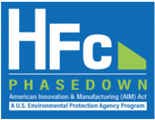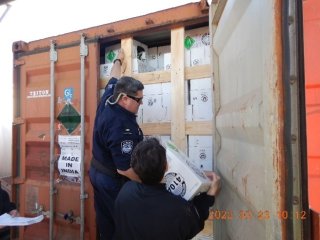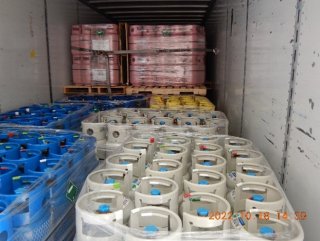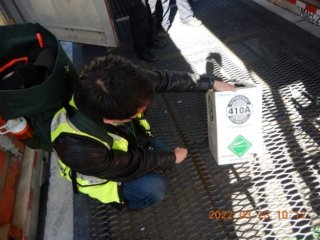EPA Targeting Illegal Imports of Hydrofluorocarbon Super-Pollutants to Combat Climate Change
The American Innovation and Manufacturing Act (AIM Act) authorizes the U.S. Environmental Protection Agency to address hydrofluorocarbons (HFCs) by providing new authorities in three main areas: to phase down the production and consumption of listed HFCs, manage these HFCs and their substitutes, and facilitate the transition to next-generation technologies through sector-based restrictions. The AIM Act directs the EPA to phase down production and consumption of HFCs to 15% of their baseline levels in a stepwise manner by 2036 through an allowance allocation and trading program.
This Enforcement Alert emphasizes that the EPA is vigorously enforcing the AIM Act, using civil and criminal enforcement authorities, to prevent the illegal import, production, sale, or distribution, and/or offering for sale or distribution of the super-polluting greenhouse gases (GHGs) known as HFCs. This Enforcement Alert provides information to the regulated community on common compliance issues observed to date with the importation of bulk1 HFCs to help ensure regulated entities can take the necessary steps to avoid potential EPA enforcement actions.
Hydrofluorocarbons: Climate Impact and Importance of Phasing Down
HFCs are potent, super-polluting greenhouse gases. HFCs have a global warming potential that can be hundreds to thousands of times greater than carbon dioxide. The planet’s surface temperature is projected to increase by up to 0.5 degrees Celsius due to HFCs alone by 2100 if HFCs are not controlled. This is a significant portion of the current total projected climate warming of 1.2 to 4.1 degrees Celsius by 2100. A global HFC phasedown through the HFC Allocation Program is expected to avoid this warming and the climate ramifications that would come with an up to 0.5-degree Celsius increase.

HFCs often serve as replacements for ozone-depleting substances (such as chlorofluorocarbons, or CFCs) and are commonly used in sectors such as refrigeration, air conditioning, aerosols, fire suppression products, and as foam blowing agents. Alternative options with lower global warming potentials (GWPs) than high-GWP HFCs are currently on the market, and the EPA expects their availability to continue to increase as HFCs are phased down.
National Enforcement and Compliance Initiative
The Mitigating Climate Change National Enforcement and Compliance Initiative (NECI) uses the EPA’s criminal and civil enforcement authorities to address three significant contributors to climate change:
-
Methane emissions from oil and gas facilities;
-
Methane emissions from landfills; and
-
The use, importation, and production of HFCs.
The EPA’s enforcement and compliance program has documented widespread noncompliance in all three of these areas, including the HFC sector. This NECI will help achieve the EPA’s goals to combat climate change while also addressing significant noncompliance in specific industry sectors that are sources of harmful pollution.
How Do Allowances Work?

Starting in January 2022, federal regulations have prohibited importing or producing bulk HFCs without sufficient valid allowances. All valid allowances are issued by the EPA to certain entities who may expend the allowances themselves or, subject to certain conditions, transfer their allowances to other entities. Bulk HFCs imported into U.S. Foreign Trade Zones (FTZs) are subject to the same AIM Act requirements as imports into U.S. ports. The AIM Act defines the term import “as to land on, bring into, or introduce into, or attempt to land on, bring into, or introduce into, any place subject to the jurisdiction of the United States, regardless of whether that landing, bringing, or introduction constitutes an importation within the meaning of the customs laws of the United States." 42 U.S.C. 7675(b).
More information on how allowances work is available on the EPA’s HFC Allowances web page, which includes lists of entities which have received allowances from the EPA to date.
Consequences of Noncompliance
HFCs are imported into the United States by land, sea, and air, and are routinely inspected by the U.S. Customs and Border Protection (CBP) and the EPA. Since January 1, 2022, when HFC phasedown regulations took effect,2 the EPA has worked with the CBP to prevent the illegal entry of numerous shipments of bulk HFCs imported into the U.S. The EPA and CBP jointly have reviewed thousands of shipments since 2022.
Compliance with the allowance system is critical to assuring the success of the United States’ HFC phasedown program. Illegal imports of HFCs undermine the phasedown, disadvantage companies who follow the rules, and contribute to global warming. The EPA has made it a top priority to address the illegal import of HFCs under the current phasedown and has pursued a number of civil and criminal cases with multiple persons and companies that have imported HFCs without the required allowances.
Violations of the requirements established in the AIM Act may be subject to administrative, civil, or criminal enforcement actions. Criminal violations of the AIM Act and other applicable statutes including smuggling, conspiracy, money laundering, and false statements can result in criminal penalties, incarceration, restitution, negotiated and court ordered environmental projects. Currently, illegally importing HFCs may result in civil judicial penalties of up to $121,2753 per violation. For noncompliant allowance holders, the EPA may also apply administrative consequences to retire, revoke, or withhold allowances, or ban a company from receiving, transferring, or conferring allowances.
Recent Civil Enforcement Actions
Resonac America, Inc. (March 2024)

The EPA and Resonac America, Inc. reached a settlement agreement to resolve violations of the prohibition on importing bulk regulated substances into the United States without possessing sufficient allowances at the time of import. Resonac illegally imported over 2,800 kgs of HFC-23. As part of the settlement, Resonac agreed to pay a civil penalty of $416,003 and to destroy over 760 kgs of HFCs.
- Press Release: EPA reaches settlement with Resonac America for illegal import of super climate pollutant at Port of Los Angeles
- Consent Agreement and Final Order: Resonac America, Inc. (pdf)
Open Mountain Energy, LLC (January 2024)
The EPA and the CBP prevented Open Mountain Energy, LLC, from importing 20,000 kgs, or approximately 20 metric tons, of HFC-245fa into the United States. Open Mountain Energy, LLC violated the prohibition on importing bulk regulated substances into the United States without expending allowances as required by 40 CFR. § 84.5(b). Open Mountain Energy, LLC, paid a civil penalty of $41,566 to resolve the violations.
- Press Release: EPA Enforcement Prevents Multiple Illegal Imports of Super Climate Pollutant
- Consent Agreement and Final Order: Open Mountain Energy, LLC (pdf)
HVAC Services (April 2024)
The EPA and HVAC Services reached a settlement agreement to address the illegal importation of HFCs from Mexico totaling approximately 10,920 kg of R-404A, R-410A, and R-407C shipments. These bulk substances were imported without the importer expending consumption allowances which violates 40 C.F.R. § 84.5(b). HVAC Services agreed to pay a civil penalty of $77,679 to resolve these violations.
- Consent Agreement and Final Order: HVAC Services (pdf)
USA Wholesale, Inc. (April 2024)

The EPA filed an administrative complaint under the AIM Act against USA Wholesale, Inc. for violating the prohibition on importing bulk regulated substances into the United States without expending allowances as required by 40 C.F.R. § 84.5(b). USA Wholesale attempted to illegally import 15,640 kgs of HFC-134a, but the EPA and the CBP intercepted and exported the shipment.
- Press Release: EPA Files Complaint Against California Company for Unlawful Import of HFCs
- Administrative Complaint: USA Wholesale, Inc.
Clean Venture, Inc. (May 2024)
The EPA reached a settlement agreement with Clean Venture, Inc. to address the illegal import, without allowances, of a combined total of over 2,000 kg of HFC-134a, R-407C, and R-404A. Clean Venture re-exported the HFCs outside of the U.S. and has paid a penalty of $11,663.
- Expedited Settlement Agreement and Final Order: Clean Venture Inc. (pdf)
Criminal Enforcement
United States v. Hart (March 2024)
Earlier this year, the first criminal case related to the AIM Act was indicted. Michael Hart of San Diego was arrested and charged with illegally smuggling HFCs and HCFCs into the United States from Mexico and selling them for profit. The indictment alleges that Hart purchased refrigerants in Mexico and smuggled them into the United States in his vehicle, concealed under a tarp and tools. Hart posted the refrigerants for sale on OfferUp, Facebook Marketplace, and other sites. Hart has been charged with conspiracy, importation contrary to law, and sale of merchandise importation contrary to law. The maximum penalty for a smuggling charge under 18 U.S.C. § 545 is 20 years in prison and a $250,000 fine.
- DOJ Press Release: Southern District of California | San Diego Man is First in Nation to be Charged with Smuggling Potent Greenhouse Gases into the United States | United States Department of Justice
- DOJ Video Statement on First Greenhouse Gas Smuggling Prosecution
- EPA Press Release: California Man Arrested for Smuggling Potent Greenhouse Gas into the United States
Since March, defendants in four additional cases have been charged with illegally smuggling HFCs contrary to the AIM Act.
Audit Policy
The EPA Audit Policy, formally titled “Incentives for Self- Policing: Discovery, Disclosure, Correction and Prevention of Violations,” safeguards human health and the environment by providing several major incentives for regulated entities to voluntarily discover and fix violations of federal environmental laws and regulations. Regulated entities of any size who voluntarily discover, promptly disclose, expeditiously correct, and take steps to prevent recurrence of potential violations may be eligible for a reduction or elimination of any civil penalties that otherwise might apply. Most violations can be disclosed and processed via the EPA’s automated online “eDisclosure” system. To learn more about the EPA’s violation disclosure policies, including conditions for eligibility, please review the EPA’s Audit Policy web page.
For More Information
-
Enforcement of the American Innovation and Manufacturing Act of 2020 EPA web page.
-
Fiscal Years 2024 – 2027 National Enforcement and Compliance Initiatives (NECIs) EPA web page.
-
Protecting our Climate by Reducing Use of HFCs EPA web page.
-
Enforcement of the Greenhouse Gas Reporting Program: HFC Importers EPA web page.
-
Greenhouse Gas Reporting Program (GHGRP) EPA web page.
Contact Information
To contact EPA regarding this Enforcement Alert, send an email to the enforcement program mailbox: HFCenforcement@epa.gov.
Disclaimer: This Enforcement Alert addresses select provisions of EPA regulatory requirements under the American Innovation and Manufacturing Act using plain language. Nothing in this Enforcement Alert is meant to replace or revise any EPA regulatory provision, or any other part of the Code of Federal Regulations, the Federal Register, the American Innovation and Manufacturing Act, or the Clean Air Act.
Footnotes
- The term “bulk” refers to an HFC of any amount which must first be transferred from its container to realize its intended use. For example, products which have been made and include HFCs already, like a refrigerator or aerosol can, would not be considered to contain “bulk” HFCs. For the full definition of “bulk,” see: 40 C.F.R. part 84 provisions on the definition of “bulk.” ↵
-
The regulations for the phasedown of HFCs are found at 40 C.F.R. Part 84.↵
-
This amount will increase with inflation over time, see 40 C.F.R. Part 19.4.↵
